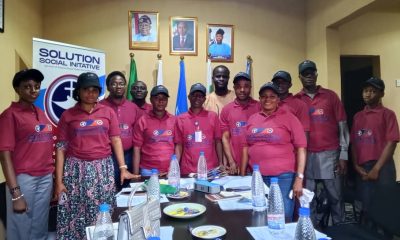Opinion
Exploring Waste For Wealth
As I listened to tales of men and women who have made it through the dumps, I was forced to adopt a local proverb that says, “underneath sandy hands are oily mouths”. Although most people see refuse related ventures as dirty, awkward and nauseating, there are proofs that the benefit of investing in waste far outweighs its challenges. Little wonder, Ade Ogunbowale is proud to say that he feeds his family with proceeds from waste recycling.
Ogunbowale, a graduate of Mechanical Engineering, is not alone in this business. Olaide Adeyemi Oyodele, (a graduate of Accounting) who had worked in the financial sector for 15 years, said she decided to take advantage of two major situations to venture into waste management and recycling. The Eco@Africa, a Nigerian initiative, has turned its hand to recycling waste, now, they teach others to do same.
In Lagos State, you can easily spot scrubby waste points tucked behind bustling market places and on undeveloped lands, as well as women in green overalls and tattered dresses moving around searching for waste. Here in Rivers State, young men move from one dump site to another, passing through people’s backyard in wheel barrows searching for waste. These are people who seem to have broken a new ground by delving into a terrain where many dread to tread. They are driven by their discovery of the economic potentials of waste.
Surprisingly, waste, which people do not value anymore and would like to discard to the bin or dump site, is now what many people and businesses would want to pay for. Sometimes, the empty box, or even the paper bag used in carrying stuffs off the market stalls becomes waste simply because the user has no further need for them, and would like to dispose them.
These so-called wastes increase as the population of a place increases. It is more in a growing economy where peoples’ income is constantly on the increase. With rapid economic development and urbanization, the next neighbour’s wealth is usually showcased in the amount of household goods he procures from the market.
Recent technological break-through across the globe has not even helped matters. As household goods constantly undergo remodeling processes at very short intervals, lovers of the ‘trendy’ always relegate what is still useful to the waste bin on grounds of going for the vogue. Moreso, as technology tends to make life easier for humanity, it causes users of products to discard in a hurry what hitherto were used overtime, simply because same are now packaged in forms that make them discardable in just one use. Products in sachet and in very little bottles are good example, although they are not biodegradable. The fact that they are not billed for a re-use, makes their disposal inevitable.
However, I am not concerned about the growing rate of waste in our environment, what is of utmost concern to me, is the attitude of people towards the management of the waste which they generate.
As long as we exist, waste remains a part of our lives. Although some people may produce more waste than others due to their activities, everybody produces it on daily basis either as left-over food or garbage. Therefore, management of waste remains key to a healthy environment.
Due to stronger health, hygiene and sanitation law in some African cities, the illegal dumping of refuse has become much harder for most people. More households are now willing to pay local waste collectors to get rid of their garbages. However, even as some African countries are becoming more environmentally responsible, some people in our clime still find it easy and convenient to dump their garbages in unauthorized dump-sites which end up blocking drainage and causing environmental hazards.
Thus, the mere fact that every household generates waste makes it more burdensome on the government to single-handedly bear the brunt of evacuating waste. This is where the effort of some individuals who undertake waste evacuation as a venture is commendable. But whether it is the government or individuals or even both, evacuation of waste merely portends a temporary removal of waste from our immediate environment to probably a distant location, which still leaves same environmental impact on the people.
The pollution from waste can get into river, killing aquatics life. The toxins produced also can render farmlands infertile. Only the management of waste, via recycling process, has the potential for a healthier, cleaner and more sustainable environment.
Apart from reducing waste dumped within human sight, waste management, which is all about re-using and recycling, provides employment, introduces cheaper (recycled) product alternatives in the market and reduces incidents of disease outbreak.
An engagement in waste management would, therefore, be considered a worthwhile venture because it does not only keep the undertaker busy, it is economically rewarding. Besides, it is a green sector yet to be explored by many.
Opinion
Balancing Religious Freedom and Community Rights

Quote:”Communities have rights to peace, safety, and quality of life. Noise pollution, crowds, or other impacts from religious activities can affect these rights. Balancing these interests requires consideration and dialogue”.
Opinion
Kids Without Play Opportunities

“All work and no play”, its said, “makes Jack a dull boy.” Despite this age-long maxim that recognises the role of play in early childhood development, play appears to be eluding many Nigerian kids. The deprivation of play opportunities comes in different forms for the Nigerian child depending on family’s social setting or status, but the effect is much the same. For children in Nigerian poor families, life is becoming as much a hassle as it is for their struggling parents. Due to harsh economic conditions, many families resort to engaging their kids prematurely in trading activities especially in hawking, to help boost family revenues, when these kids should be enjoying leisure after school. Some of these children barely attend schools while being forced to spend much of their childhood hustling in the streets. For children from well-off families, time could be as crunchy as it is for their busy parents when, obsessed with setting agenda for the future of their kids, parents arrange stringent educational regiment too early for their kids.
These group of children are made to get-off the bed by 5.30am every weekday, get ready for private school buses that call at 6.00am, otherwise report by however means to school at 7.20am.The situation is worse for kids in the city of Lagos where the need to beat urban traffic rush-hours is very high. Most children are further subjected to extra hours of lessons after school at 2.00pm, only to be released with loads of homework. On many occasions children who leave home for school at 6.30am get back by 3.30pm. With hardly enough time to eat, do school assignments and take afternoon naps, these children hardly had time for plays before dinners. In Nigeria, kids of ages between 3 and 12 spend averages of 9 hours a day and 45 hours a week to and from schools, and additional hours doing home assignments and domestic jobs, whereas their peers in developed countries spend about half that duration and have more time for leisure.
Any remaining spare time left after school work or street hustle is further stolen, when kids who usually are fascinated by gadgets, are exposed to household electronics like phones, tablets and gaming consoles. Electronic games may create a sense of leisure, but the difference with human interactions is that kids doing games interface mostly with machines or with programme structured in ways that entrap a child’s pysch directionally, according to the game’s programming, in ways that may not encourage independent thinking. Moreso, attraction to such gadgets displaces kids’ attention from important television and radio programmes. The prevalent tight, academic schedules for some Nigerian kids, though intended for academic excellence, encroaches on childhood leisure time needed to achieve an all-round childhood development, and could make children to resent formal education altogether. Besides, academic excellence or economic pursuit, is not all there is to living a well-nurtured life.
Children’s leisure time, defined as time left over after sleeping, eating, personal hygiene and attending school or day-care, is very crucial to childhood development. Sociologists recommend that children should have at least 40 per ceny of the day as leisure. According to Berry Brazelton, a former pediatrician at Harvard Medical School, “Play is the most powerful way a child explores the world and learns about him or herself.” Unstructured play encourages independent thinking and allows the young to negotiate their relationships with their peers, and in the process build self-confidence and self-control. Play is one of the important ways in which young children gain essential knowledge and skills. Leisure time enhances learning as fun enables children to learn at their own level and pace. Young children naturally explore and learn many skills by making cognitive connections from events that catch their attention.
Unstructured plays help children developed their cognitive, physical and communication skills that make them acquire social qualities necessary in navigating relationships in adult life. Plays enable children assess how others feel and learn perspectives as well as empathy through observing differences in facial expressions, body language and even tone of voice, which helps them copy how to express themselves to others, and therefore develop socially acceptable behavours that build relationships. In cooperative activities, children willingly take things in turn and may delegate roles. Children can also share the glory of winnings through competitive games, which is all great for working together in task sharing. Aside encouraging parents to ensure adequate leisure time for their kids at home, schools should make plays and exercises an integral part of the educational curriculum. The educational curriculum set by the Nigerian Educational Research and Development Council (NERDC) includes specific training durations and break periods, as well as sporting activities, as part of the school system.
Due to poor government funding, sports in public schools have declined, while most private schools lack sporting infrastructure or even play grounds. These make recreational activities and sports implementation almost impossible in schools. Also, the increasing rate of urbanisation in Nigerian communities is gradually eroding ancient playgrounds, while established urban centres have lost community playgrounds. With tightening apartment spaces now being the norm in most urban residential areas, many kids are forced to wriggle within burglary-proof enclosures. Nigerian governments and the relevant agencies should ensure that existing child labour protection laws, educational and urban development codes are implemented in the country, to enable proper nurturing of children as the future stakeholders of our society. Private schools, especially, should be supervised to ensure they follow the educational curriculum standards set by NERDC.
In a bid to impress parents and draw more patronage as better option than public schools, private schools, most of whom operate in cramped environments, have continued to set high regiments of training schedules beyond the capacity of most kids, and even encourage enrollment of pre-school age kids who can not sit still to listen for an extended periods of time. Schools, from creche to secondary levels, without playgrounds and recreational facilities should not be allowed to operate, and should be made to understand and implement appropriate curriculum and training durations. Many Nigerian kids, whether from rich or poor families, appear to have been set-up inadvertently, in the same leisure denial that affects their parents. All work and no play could lead to some messed-up kids who grow up not understanding social cues, and being unemotional and self-centered, manifest later as obsessive-compulsive adults.
By: Joseph Nwankwo
Opinion
Congratulations Fubara, Joseph Of Rivers State

We thank God who is above all human contrivance and arrogance. Congratulations, Your Excellency Amaopusenibo Sir Siminalayi Joseph Fubara. Your victory takes us back to the Bible as a living document of a God that rules in the affairs of all His creation. In a manner of speaking, welcome back from your first war with Phillistines, Your Excellency! Yes, first example is David and Goliath! And like David, Your Excellency stands over Goliath in victory. But that is not enough. Our real enemy is that Your Excellency is Governor of a State with a wretched economy. Indigenes of Your State are today reduced to battalions of beggars waiting for who will hire their loyalty on the usual “pay-as-you-go” basis.
Your Excellency, it brings us to another Bible- based parallel. Conscientious Rivers indigenes above 50, should identify with and commit our all to this second parallel. It is to liberate the economy and people of Rivers people from 23 years enslavement and poverty, for us to regain our dignity and pride. When the economy of Egypt was drifting into a disaster zone, even Pharaoh did not know it. He also did not know what to do. But God sent a Joseph to build the economy into a fortress of good fortune that overcame the economic and social disaster Egypt did not know was ahead. Your Excellency for 23 years, Rivers State has been ruled without any logical, credible and consistent PLAN of how to overcome mass poverty from our dehydrated local economies.
Your Excellency, Rivers State cannot survive one month without Federal allocation! So called IGR only about 10 per cent of Federal allocation.It is also not based on what we produce but on tax from other people’s productivity that pass through our State. Pharaoh did not know what to do in the case of Egypt. May it please God to position another Joseph in Governor Siminalayi Joseph Fubara to heal Rivers State and build an economy that all Africa will come to access in order to chart a new course out of worsening economic hardship that is caused by near zero investment in productivity and endemic reckless looting. They are the twin chambers nursing a corporate cancer unfolding across Nigeria and Africa. The hard work begins today, Your Excellency.
We need an economic blueprint that will enrich every Rivers senatorial district from investment to grow productivity and to enrich every Rivers person from career-based productive labour, just as Pharaoh was enriched by Joseph’s economic Blueprint. Let Rivers State stop the trend of waiting the lives of young Rivers people recruited by Phillistines into cultism, thuggery and easy money, as a career. These Phillistines believe they have only lost one phase of many legal battles and battles by other means. But from comments in the public media, their eyes are fixed on 4-years of war and more! Your Excellency, we the people will not let you forget what you owe us. We have to make unbelievers see that your leadership is different and that we are uprooting the old order of an unproductive Feudal System. That system makes a few persons and their cronies to monopolise our collective wealth, while the majority are left in misery. Let’s put an end to enslavement by cabals and mass poverty in Rivers State. That is when the Phillistines will surrender.
By: Amaopusenibo Brown
-

 Niger Delta5 days ago
Niger Delta5 days agoSSI Moves To Empower Residents Of N’Delta Communities
-
Business1 day ago
Bayelsa Recommits To Agro-Economy Diversification … As Delegation Rounds-Off Rwandan Tour
-
Niger Delta1 day ago
Oborevwori Pledges Commitment To Renewable Energy Investments In Delta … As Delta Signs MoU With REA
-
Business1 day ago
Shippers Council Seeks collaboration Against Stowaways
-
Politics1 day ago
Rivers APC Chairmanship Candidates Hail Tinubu, Yilwatda Over By-Election Victory
-
Politics1 day ago
PDP Drags Osun Federal Lawmakers To Court Over Defection To APC
-
Business1 day ago
FG Commits To Building Modern Maritime Sector
-

 News23 hours ago
News23 hours agoOver 1,500 RSU Students Apply For Education Loan

